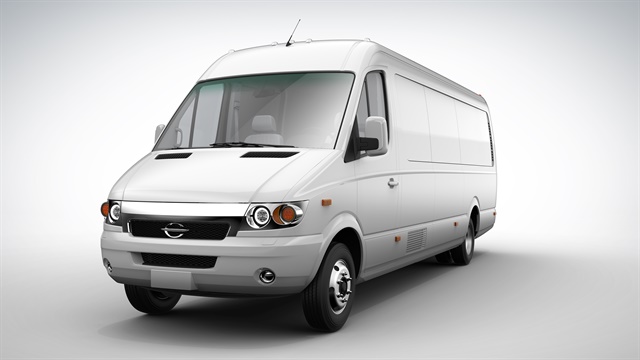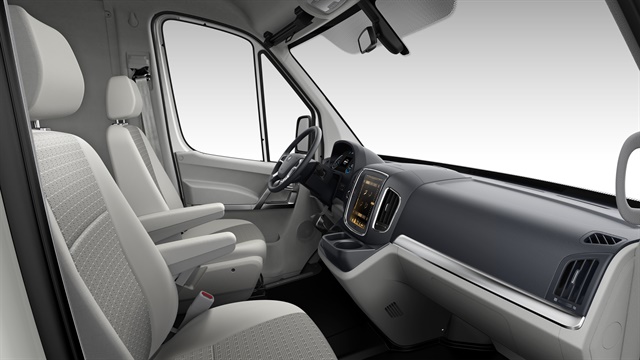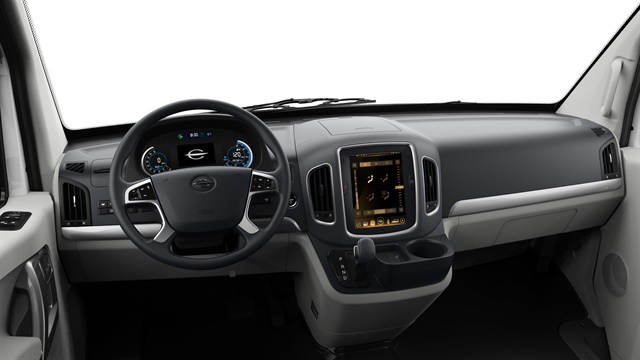
A California-based electric vehicle and energy solutions company, Chanje, will bring to the U.S. market in the fourth quarter a Class 5 panel van that it says can be economically produced at a scale and price not previously possible. The company says it already has volume orders for Q4 delivery of its ground-up designed and purpose-built all-electric vehicle.
Chanje is a privately held, U.S. registered corporation with initial strategic investment from Hong Kong-based FDG Electric Vehicles Limited (HKEX:00729). FDG brings an investment more than $1 billion in medium-duty EV R&D to the partnership. Chanje provides global expertise from the transportation sector through a deep understanding of clean-energy vehicle engineering and adoption.
Chanje says it chose to partner with FDG in order to leverage the economies of scale found in the Central Asian markets.
Chanje CEO, Bryan Hansel, told Heavy Duty Trucking the vehicle was designed from the start as a long-life, global-platform vehicle that could leverage not only U.S. domestic volume but also to capture significant market share in Europe as well as Asia.
“We have designed a vehicle that will play well in several different markets so that we can leverage the supply chain and get that volume,” he says. “For the first time, the North American fleet market has an opportunity to access a world-class, high quality and cost effective commercial electric truck.”
The first model to be released in the U.S. is a Class 5 commercial panel van equipped to haul a payload of up to 6,000 pounds on an “average” urban delivery route of about 70 miles a day. Hansel says the truck will be a high-roof model with roughly double the cubic capacity of current EV offerings and a significantly higher gross vehicle weight. The projected range of the battery system is said to be 100+ miles.
Chanje will later introduce a full range of electric trucks from class 4 to Class 6 along with a 15- to 20-passenger airport-style shuttle bus.
“We will build the entire vehicle in a high-volume OEM environment where historically we have seen cut-away chassis with third-party bodies,” Hansel says. “These vehicles are built more like cars than trucks from unibody construction to the OEM fit and finish we see in automotive manufacturing.”

Initial production of the first American orders is on the assembly line now at a manufacturing facility in mainland China. Production will continue there through 2018, Chanje says, while it selects and develops a U.S manufacturing site, likely to be located close to a port facility somewhere west of the Mississippi.
Chanje’s concept, from the start, is to build an electric commercial vehicle that will fit easily into any market on the planet. With a few local exceptions, there are no varying environmental regulations to contend with, which have hamstrung producers of vehicles equipped with internal combustion engines from selling product globally. There are variations in vehicle safety standards for different regions such as lighting requirements or bumper configurations, but Hansel says they can be easily accommodated.
“Our entire powertrain is unsprung weight sitting across the rear axle of the vehicle powering two hub-mounted motors,” he says. “The length of the vehicle can vary, right-hand or left-hand drive, you name it. We have no volume concerns because there is nothing to get in the way.”
Competitive Pricing
While Hansel declined to discuss exact pricing, he said it will be very straight forward, with an emphasis on leasing programs. The way Hansel describes it, a truck is a truck and energy is energy.
“When you look just at the truck, we believe it can be absolutely competitive on the cap-ex side,” he says. “On the operational side, the battery rental fee plus the electricity will be very close to the cost of the fuel you’d otherwise be putting into the vehicle. The owner’s cash flow from month-one will be very similar. We think we’ll be very close to price parity [with a similar diesel vehicle] right out of the gate. We can show them from the first year out to the tenth year, that we have a very competitive cash-flow product from day-one.”
Chanje will work with large fleet customers to provide renewable energy and charging capabilities as a turnkey service. The goal is to support organizations as they transition to energy systems that are secure, stable, local, renewable and efficient. This will be in the form of a micro-grid depot solution that is expected to include four components a renewable energy source, the charging infrastructure, energy storage and grid services.
The vehicles are designed to be all-electric from the ground-up and developed to meet global quality and durability standards. Chanje says a ground-up designed EV can be produced economically at scale and provides substantially improved safety, reliability, and energy efficiency. The company predicts customers will see an average of 70% lower maintenance costs and 70% savings in fuel costs versus a diesel equivalent. Chanje says its vehicles have demonstrated greater than 50 MPGe fuel economy in city and highway driving when tested by independent third-parties. (MPGe or “miles per gallon equivalent” represents the average miles traveled per unit of energy consumed when compared to 1 gallon of fuel.)

Chanje sees an opportunity to dramatically reduce emissions from commercial vehicle traffic in urban centers as they have the highest concentration of diesel-powered trucks and buses. Currently, medium-duty diesel vehicles account for 18% of all greenhouse gas emissions from the transportation sector nationwide. The company says upgrading from a diesel truck to medium-duty zero-emission electric truck will reduce noise pollution in cities, neighborhoods and along roadways, increase driver health, safety, and satisfaction while save as much CO2 emissions as 20 acres of U.S. forest would absorb in one year.
The Executive Team
Chanje’s executive team includes members with experience from the automotive and clean energy industries, including Tesla, Daimler, Volkswagen, Schneider Electric, U.S. EPA and others.
- Bryan Hansel, CEO – previously with Smith Electric Vehicles (U.S.), previous experience includes the fields of health care, technology and transportation.
- Ian Gardner, President – previously The Boston Consulting Group (BCG), Duke Energy, Los Angeles Clean Tech Incubator and others
- Joerg Sommer, Chief Operating Officer – previously SVP at Volkswagen, Daimler, Renault and others
- James Chen, VP and General Counsel – previously VP at Tesla, two of Washington, D.C.’s top law firms, the U.S. EPA and others
- Jeff Robinson, VP of Manufacturing – previously Tesla, Ford, Mazda, General Motors and others
- Suresh Jayanthi, VP of Energy Services – previously Schneider Electric and others
In the coming weeks, Chanje will announce a major U.S. service, parts and distribution partnership that will provide a foothold in the domestic market.
For more information, please visit: www.chanje.us
Follow @HDTrucking on Twitter
